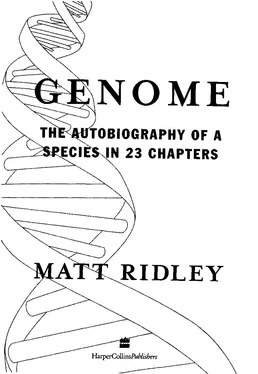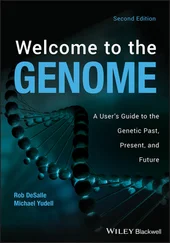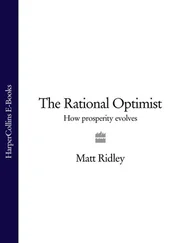Genome - Matt Ridley
Здесь есть возможность читать онлайн «Genome - Matt Ridley» — ознакомительный отрывок электронной книги совершенно бесплатно, а после прочтения отрывка купить полную версию. В некоторых случаях можно слушать аудио, скачать через торрент в формате fb2 и присутствует краткое содержание. Жанр: Старинная литература, на английском языке. Описание произведения, (предисловие) а так же отзывы посетителей доступны на портале библиотеки ЛибКат.
- Название:Matt Ridley
- Автор:
- Жанр:
- Год:неизвестен
- ISBN:нет данных
- Рейтинг книги:5 / 5. Голосов: 1
-
Избранное:Добавить в избранное
- Отзывы:
-
Ваша оценка:
- 100
- 1
- 2
- 3
- 4
- 5
Matt Ridley: краткое содержание, описание и аннотация
Предлагаем к чтению аннотацию, описание, краткое содержание или предисловие (зависит от того, что написал сам автор книги «Matt Ridley»). Если вы не нашли необходимую информацию о книге — напишите в комментариях, мы постараемся отыскать её.
Matt Ridley — читать онлайн ознакомительный отрывок
Ниже представлен текст книги, разбитый по страницам. Система сохранения места последней прочитанной страницы, позволяет с удобством читать онлайн бесплатно книгу «Matt Ridley», без необходимости каждый раз заново искать на чём Вы остановились. Поставьте закладку, и сможете в любой момент перейти на страницу, на которой закончили чтение.
Интервал:
Закладка:
One man deserves to be singled out for mounting opposition to this bill: a radical libertarian MP with the famous - indeed relevant
- name of Josiah Wedgwood. Scion of the famous industrial family that had repeatedly intermarried with the Darwin family — Charles Darwin had a grandfather, a father-in-law and a brother-in-law (twice over) each called Josiah Wedgwood — the latest Josiah was a naval architect by profession. He had been elected to Parliament in the Liberal landslide of 1906, but later joined the Labour party and retired to the House of Lords in 1942. (Darwin's son, Leonard, was at the time president of the Eugenics Society.) Wedgwood disliked eugenics intensely. He charged that the Eugenics Society was trying 'to breed up the working class as though they were cattle' and he asserted that the laws of heredity were 'too E U G E N I C S 295
undetermined for one to pin faith on any doctrine, much less to legislate according to it'. But his main objection was on the grounds of individual liberty. He was appalled at a bill that gave the state powers to take a child from its own home by force, by clauses that granted policemen the duty to act upon reports from members of the public that somebody was 'feeble-minded'. His motive was not social justice, but individual liberty: he was joined by Tory libertarians such as Lord Robert Cecil. Their common cause was that of the individual against the state.
The clause that really stuck in Wedgwood's throat was the one that stated it to be 'desirable in the interests of the community that [the feeble-minded] should be deprived of the opportunity of procreating children.' This was, in Wedgwood's words, 'the most abominable thing ever suggested' and not 'the care for the liberty of the subject and for the protection of the individual against the state that we have a right to expect from a Liberal Administration'.6
Wedgwood's attack was so effective that the government withdrew the bill and presented it again the next year in much watered-down form. Crucially, it now omitted 'any reference to what might be regarded as the eugenic idea' (in McKenna's words), and the offensive clauses regulating marriage and preventing procreation were dropped. Wedgwood still opposed the bill and for two whole nights, fuelled by bars of chocolate, he sustained his attack by tabling more than 200 amendments. But when his support had dwindled to four members, he gave up and the bill passed into law.
Wedgwood probably thought he had failed. The forcible committal of mental patients became a feature of British life and this in practice did make it harder for them to breed. But in truth he had not only prevented eugenic measures being adopted; he had also sent a warning shot across the bows of any future government that eugenic legislation could be contentious. And he had identified the central flaw in the whole eugenic project. This was not that it was based on faulty science, nor that it was impractical, but that it was fundamentally oppressive and cruel, because it required the full power of the state to be asserted over the rights of the individual.
296 G E N O M E
In the early 1930s, as unemployment rose during the depression, eugenics experienced a marked revival. In Britain the membership of eugenic societies reached record levels, as people began, absurdly, to blame high unemployment and poverty on the very racial degeneration that had been predicted by the first eugenists. It was now that most countries passed their eugenic laws. Sweden, for instance, imple-mented its compulsory sterilisation law in 1934, as did Germany.
Pressure for a British sterilisation law had again been building for some years, aided by a government report on mental deficiency known as the Wood report, which concluded that mental problems were on the increase and that this was partly due to the high fertility of mental defectives (this was the committee which carefully defined three categories of mental defectives: idiots, imbeciles and the feeble-minded). But when a private member's eugenics bill, introduced to the House of Commons by a Labour M P , was blocked, the eugenics pressure group changed tack and turned its attention to the civil service. The Department of Health was persuaded to appoint a committee under Sir Laurence Brock to examine the case for sterilis-ing the mentally unfit.
The Brock committee, despite its bureaucratic origins, was parti-san from the outset. Most of its members were, according to a modern historian, 'not even in a weak sense actuated by a desire to consider dispassionately the contradictory and inconclusive evidence'. The committee accepted a hereditarian view of mental deficiency, ignoring the evidence against this and 'padding' (its word) the evidence in favour. It accepted the notion of a fast-breeding mental underclass, despite inconclusive evidence, and it 'rejected'
compulsory sterilisation only to help assuage critics - it glossed over the problem of obtaining consent from mentally defective people.
A quotation from a popular book about biology published in 1931
gives the game away: 'Many of these low types might be bribed or otherwise persuaded to accept voluntary sterilization.'7
The Brock report was the purest propaganda, dressed up as a dispassionate and expert assessment of the issues. As has been pointed out recently, in the way it created a synthetic crisis, endorsed E U G E N I C S 297
by a consensus of 'experts' and requiring urgent action, it was a harbinger of the way international civil servants would behave much later in the century over global warming.8
The report was intended to lead to a sterilisation bill, but such a bill never saw the light of day. This time it was not so much because of a determined contrarian like Wedgwood, but because of a changing climate of opinion throughout society. Many scientists had changed their minds, notably J. B. S. Haldane, partly because of the growing influence of environmental explanations of human nature promulgated by people like Margaret Mead and the behaviourists in psychology. The Labour party was now firmly against eugenics, which it saw as a form of class war on the working class. The opposition of the Catholic Church was also influential in some quarters.9
Surprisingly, it was not until 1938 that reports filtered through from Germany of what compulsory sterilisation meant in practice.
The Brock committee had been unwise enough to praise the Nazi sterilisation law, which came into force in January 1934. It was now clear that this law was an intolerable infringement of personal liberty and an excuse for persecution. In Britain, good sense prevailed.10
This brief history of eugenics leads me to one firm conclusion.
What is wrong with eugenics is not the science, but the coercion.
Eugenics is like any other programme that puts the social benefit before the individual's rights. It is a humanitarian, not a scientific crime. There is little doubt that eugenic breeding would 'work' for human beings just as it works for dogs and dairy cattle. It would be possible to reduce the incidence of many mental disorders and improve the health of the population by selective breeding. But there is also little doubt that it could only be done very slowly at a gigantic cost in cruelty, injustice and oppression. Karl Pearson once said, in answer to Wedgwood: 'What is social is right, and there is no definition of right beyond that.' That dreadful statement should be the epitaph of eugenics.
Yet, as we read in our newspapers of genes for intelligence, of germline gene therapy, of prenatal diagnosis and screening, we can-298 G E N O M E
not but feel in our bones that eugenics is not dead. As I argued in the chapter on chromosome 6, Galton's conviction that much of human nature has a hereditary element is back in fashion, this time with better — though not conclusive — empirical evidence. Increasingly, today, genetic screening allows parents to choose the genes of their children. The philosopher Philip Kitcher, for instance, calls genetic screening 'laissez-faire eugenics': 'Everyone is to be his (or her) own eugenicist, taking advantage of the available genetic tests to make the reproductive decisions she (he) thinks correct.'11
Читать дальшеИнтервал:
Закладка:
Похожие книги на «Matt Ridley»
Представляем Вашему вниманию похожие книги на «Matt Ridley» списком для выбора. Мы отобрали схожую по названию и смыслу литературу в надежде предоставить читателям больше вариантов отыскать новые, интересные, ещё непрочитанные произведения.
Обсуждение, отзывы о книге «Matt Ridley» и просто собственные мнения читателей. Оставьте ваши комментарии, напишите, что Вы думаете о произведении, его смысле или главных героях. Укажите что конкретно понравилось, а что нет, и почему Вы так считаете.












